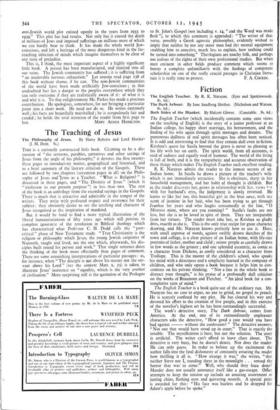The Teaching of Jesus
The Philosophy of Jesus. By Harry Roberts and Lord Horder- (j. M. Dent. 5s.) THIS is a curiously constructed little book. Claiming to be a dis- cussion of " the sermons, parables, narratives and other sayings of Jesus from the angle of his philosophy," it devotes the first twenty- three pages to introductory matter, geographical and historical, and to a brief summary of the literary criticism of the Gospels. These are followed by two chapters (seventeen pages in all) on the Philo- sophy of Jesus and 'Jesus as a Teacher. " What is Religion? " is discussed in three pages, and " The Divinity of Jesus " (which is " irrelevant to our present purpose ") in less than two. The rest of the book is an anthology from the recorded sayings in the Gospels. There is much that is attractive and admirable in the temper of the writers. They write with profound respect and reverence for their subject : they obviously desire to see the teaching and character of Jesus recognised as the inspiration of mankind.
But it would be hard to find a more typical illustration of the liberal humanitarianism of fifty years ago which still persists in complete ignorance of the revolution in Biblical theology which has characterised what Professor C. H. Dodd calls the " post- critical " phase of New Testament study. " True Christianity is the religion or philosophy which Jesus, the young Jewish carpenter of Nazareth, taught and lived, not the one which, afterwards, his dis- ciples built round his person and work." That single sentence dates the thinking of the book more effectually than pages of comment. There are some astonishing interpretations of particular passages : as, for instance, when "The disciple is Rot above his master nor the ser- vant above his Lord " (see the context Matt. x, 23) is taken, to illustrate Jesus' insistence on " equality, which is the very essence of civilisation." More surprising still is the quotation of the Prologue to St. John's Gospel (not including v. 14, " and the Word was made flesh "), to which this comment is appended: " The writer of that verse, possibly a Greek agnostic philosopher, evidently wished to imply that neither he nor any other man had the mental equipment enabling him to conceive, much less to explain, how nothing could be turned into something." Theologians are touchy folk, and perhaps too jealous of the rights of their own professional studies. But when men eminent in other fields produce comment which seems to betray a complete unfamiliarity with the findings of competent scholarship on one of the really crucial passages in Christian litera-


























 Previous page
Previous page